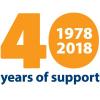As part of Sands 40th anniversary this year, we will share 40 stories by 40 parents, family members and friends affected by the death of a baby. Starting during Sands Awareness Month and our #FindingTheWords campaign, we aim to show the sheer number of people who are affected by the tragedy of a baby’s death, help other bereaved parents to understand they are not alone and raise awareness of the issues surrounding stillbirth and neonatal death. Visit our 40 stories for #Sands40 to view other blogs in the series.
My story goes back 45 years. Our first baby, Alison Margaret, died in August 1973 aged just two days.
Born normally, she suffered a major blood loss during delivery which resulted in severe brain damage. She spent the whole of her short life of 56 hours in intensive care, during which time I was never able to hold or touch her.
Each visit involved donning sterile gown, cap and shoes and there was nowhere for me to sit. I really felt I was in the way, but went along with it as I had no idea she was going to die.
I did not see her following her death – no one offered and I didn’t dare to ask. Subsequently, this caused me a great deal of distress - and can still do so. Perhaps under some misplaced sense of protection for me, I was advised not to go to her funeral and that I greatly regret.
We have no photos or any other memorabilia. My only real connection to the event is the wrist band I was wearing after delivery, and of course her birth and death certificates.
No help was offered from anyone at the hospital. After the death, their concern seemed more for the occupied bed. The midwife’s parting words were “Never mind, dear, have another one”. Possibly a well-meant remark, but it was a very hurtful comment on a life carried, delivered to the world and so precious to me. And I have never forgotten it.
At that time there were no charities to help. I asked everyone if they knew of someone who had suffered in the same way. No-one did. It happened, but was just not talked about in those days.
My husband coped by going back to work. I had no such panacea. I coped eventually with the help of two wonderful and understanding friends, one of whom (a neighbour) visited me every day, with her own baby and her toddler. I will never forget their kindness and in fact, do not think I would be as normal as I am today without their help and support.
Later, I went on to have a son and then another daughter both of whom have brought me great joy. I feel very blessed.
We moved to a new area in 1978 and everyone told me that I should put it behind me. I tried, and told my new friends an edited version of my history that left Alison out. I soon found that it was impossible to do that.
When I read an article by Bel Mooney about her stillbirth, I wrote to her and soon after I became an early member of the then SPDA (Stillbirth and Perinatal Death Association) which later became Sands.
I started the group in South Bucks, where it was such a relief to meet others who shared my experience. We all did a lot of talking and grieving through these early meetings.
Since then I have been a Sands befriender and trainer and hope I have helped in some small way to ensure that others have a better experience than I did.
15 babies die before, during or shortly after birth every day in the UK. We want to reduce this number, but we need your help. Support Sands now to help ensure a bereaved parent doesn't have to cope alone. Thank you.

